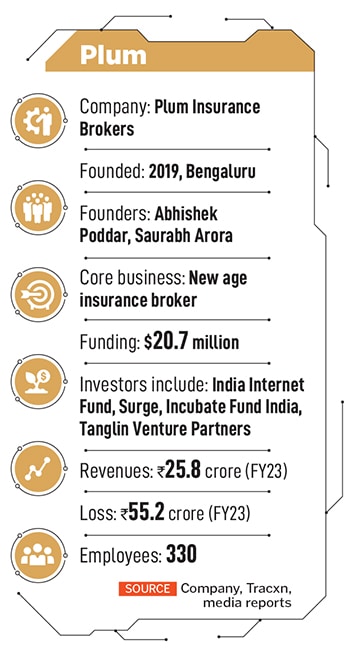How Plum is bringing fintech innovation to employee health insurance
The cofounder duo of Plum are brining fintech innovation to health insurance, and has already impacted over 500,000 people so far


One area in which the ‘tech’ has barely scratched the surface of the ‘fin’ in India is in insurance. Therefore, we thought to tell you about Plum Benefits Insurance Brokers.
The B2B2C (business-to-business-consumer) is well known. But with their prior experience—CEO Abhishek Poddar is a former product manager at Google, and CTO Saurabh Arora is steeped in computer science—Plum’s founders are bringing serious tech and product know-how to the area of employee benefits.
Both have previously built other startups and experienced ecosystems from Silicon Valley to Berlin, before they started Plum. On the one hand, they are building strong partnerships with established large insurers—think ICICI Lombard, for example—and, on the other, they’re looking at an addressable market of businesses that is ripe for innovation.
Poddar and Arora started towards the end of 2019. The company is focussed on health insurance, with more than 4,000 customers today. “They are of all shapes and sizes, from 10-person teams to 10,000-strong enterprises," Poddar said during a webinar.
 And the companies are across cities and industries in the country. “We’ve been able to impact over 500,000 people so far and our goal is to reach millions of Indians," Poddar adds. Some 70,000 claims have been processed on Plum’s platform so far.
And the companies are across cities and industries in the country. “We’ve been able to impact over 500,000 people so far and our goal is to reach millions of Indians," Poddar adds. Some 70,000 claims have been processed on Plum’s platform so far.
Customers not only include some of India’s favourite startups such as Swiggy and Groww, but also the Indian operations of well-known foreign software companies like Twilio and Atlassian.
“We are growing sustainably, we are contribution margin positive," Poddar says, meaning that, at the individual product level, each sale is contributing some money towards meeting the variable costs of the business—customer acquisition costs, for example. Fixed costs of the business are excluded here.
 Plum continues to incrementally replace manual processes with tech. For example, with the aim of being the one single interface for any employee at a corporate customer, the claims processes are 60-70 percent tech-driven, Poddar says.
Plum continues to incrementally replace manual processes with tech. For example, with the aim of being the one single interface for any employee at a corporate customer, the claims processes are 60-70 percent tech-driven, Poddar says.
For users too, there are tangible benefits, Arora adds. For example, Plum’s partnerships have helped it bring “on average ₹11,000 (a year) in savings to the members who are part of the corporates we serve" via discounts from those partners, like pharmacies, for example, he says.
As more companies look to offer better plans as a way of attracting and retaining talent, customers are bound to prefer vendors with the best technology solutions. Plum should benefit.
First Published: May 20, 2024, 11:33
Subscribe Now